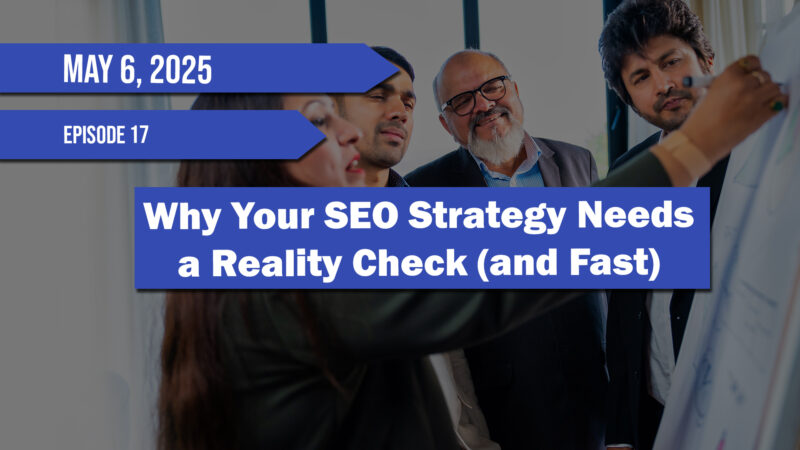Alright, let’s talk. If you’re managing SEO in 2025 and still clinging to the same playbook you were using three or five years ago, I’ve got news for you. It is time for a reality check. No fluff here. I have been doing this for decades, and I can tell you flat out: the game has changed. What used to work like clockwork in the past could now be dragging your rankings straight into the ground.
Let’s start with this: Google is not playing around anymore. The algorithm has evolved. It is not just about links, keywords, and title tags. It is about intent, trust, topical depth, and experience. Yet I still see teams focused on stuffing blog posts with every version of a keyword or buying garbage backlinks from outdated link farms. If that is your approach, you are not just behind – you are invisible.
So, why does your SEO strategy need a reality check? Let me break it down for you.
You’re Obsessed with Rankings, Not Revenue
Too many SEOs still report on keyword rankings like it’s 2012. “Hey, we moved from position 11 to 9!” Cool. But did that translate into leads? Sales? Signups? Traffic from that keyword could be worthless if the intent does not align with your business goals.
You should be measuring SEO success with KPIs that matter – conversions, lifetime value, retention, and real revenue growth. If your monthly SEO report doesn’t include those, it is time to change what you are tracking.
You Are Ignoring User Experience
Yes, UX is SEO now. Google’s Core Web Vitals are not just a set of annoying metrics – they are signals that tell Google whether your site is worth ranking. If your pages take forever to load, shift around while loading, or feel like a maze to navigate, expect your rankings to suffer. And no, throwing in a few H1 tags or compressing images once a year does not count as UX optimization.
You need to think like a user, not a bot. Can people find what they need in three clicks or less? Can they scan your content and immediately understand the value? Is your mobile experience actually usable?
You’re Creating Content Google Does Not Want
Let me be blunt: nobody cares about your 500-word fluff pieces anymore. Google is smarter than ever. It knows when content is regurgitated, thin, or written just to hit a word count. If your blog reads like it was written for a content farm in 2015, it is not helping your site. It is probably hurting it.
Today, your content needs to be strategic. That means understanding your audience’s pain points, looking at what already ranks, and doing it better. You should be creating topical clusters, supporting pages, and long-form guides that actually deliver value. Google is rewarding depth and breadth – surface-level just does not cut it.
Your Technical SEO Is a Mess
Here is something I see all the time: a site with great content and great links, but rankings still stuck. Why? Because the technical foundation is broken.
Broken links, duplicate content, bloated code, poor internal linking, crawl traps, slow load times – the list goes on. You cannot just write great content and hope it magically ranks if your site architecture is trash. SEO is holistic now. Technical health is not optional. It is the backbone of everything else.
You’re Not Leveraging AI the Right Way
Yes, AI is everywhere. Tools are pumping out content left and right, but let’s be real: most of it is junk. Just because you can generate 100 blog posts in a week does not mean you should.
AI is a tool, not a strategy. Use it to enhance your content, not replace it. Use it to analyze competitors, uncover gaps, and streamline tasks. But do not expect it to carry your entire SEO strategy. Human insight still wins. Context still matters. Creativity and empathy are what separate average sites from extraordinary ones.
You Are Not Building Real Authority
Google is leaning harder than ever into E-E-A-T. That is experience, expertise, authoritativeness, and trustworthiness. If your site lacks these signals, you are going to have a hard time ranking in competitive verticals.
You need authors with credentials. You need expert-level content that people actually trust. You need reviews, backlinks from respected sources, and a strong digital footprint that shows you are the real deal. Google wants to rank brands, not faceless pages.
You Are Treating SEO Like a Checklist
SEO is not a checklist anymore. It is a living, breathing strategy. It evolves. You cannot just optimize a page once and forget about it. You need to revisit, rework, and rethink constantly. Your competition is. The algorithm definitely is. If your strategy looks the same as it did last year, it is stale. And stale means sliding rankings.
So if any of this sounds like your current situation, it is time to step back, take a hard look at your SEO playbook, and get real about where you are going. Because SEO is not dead – it is just leaving behind everyone who refuses to evolve.
What part of your SEO strategy do you think needs a wake-up call right now?

